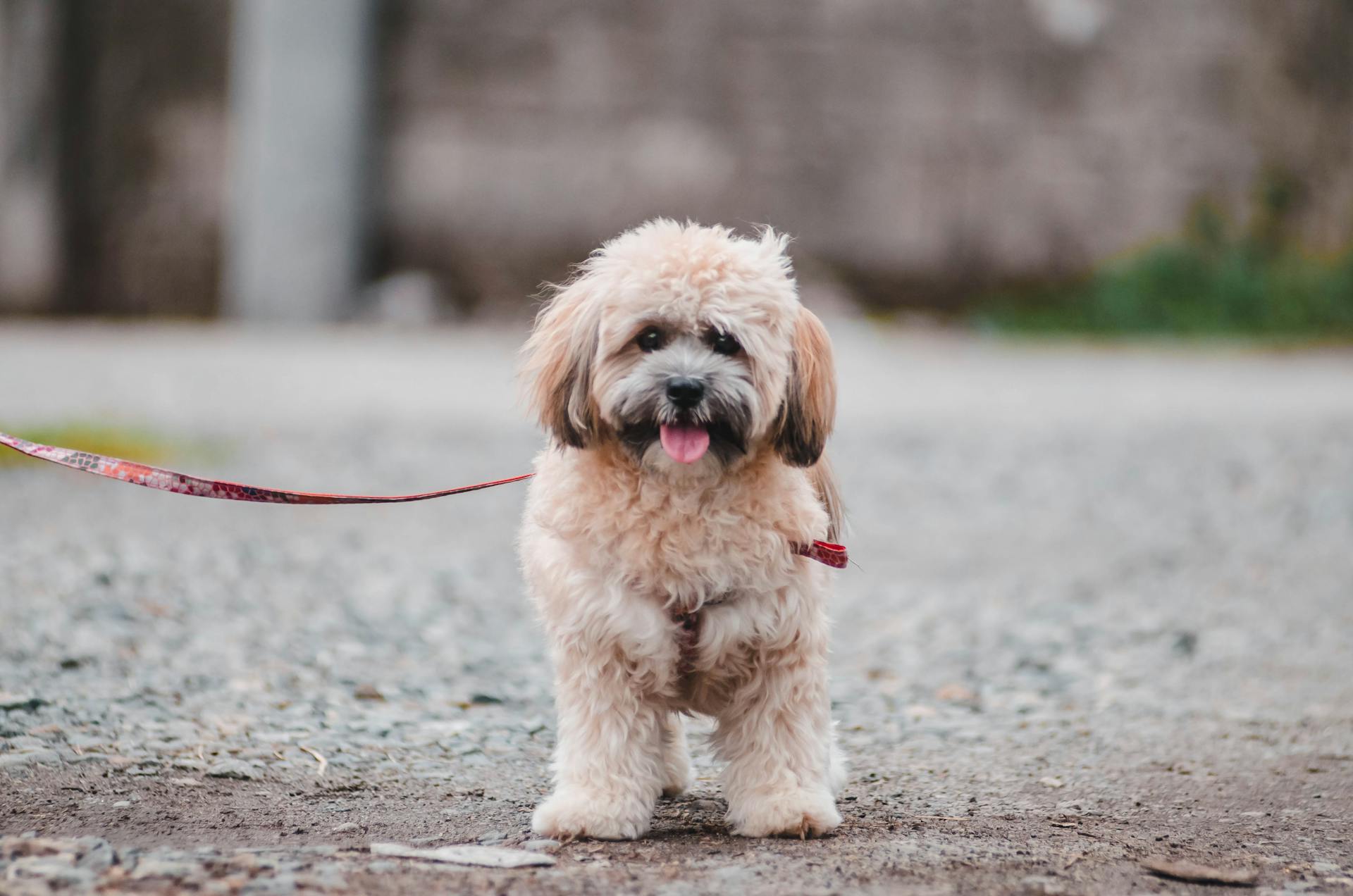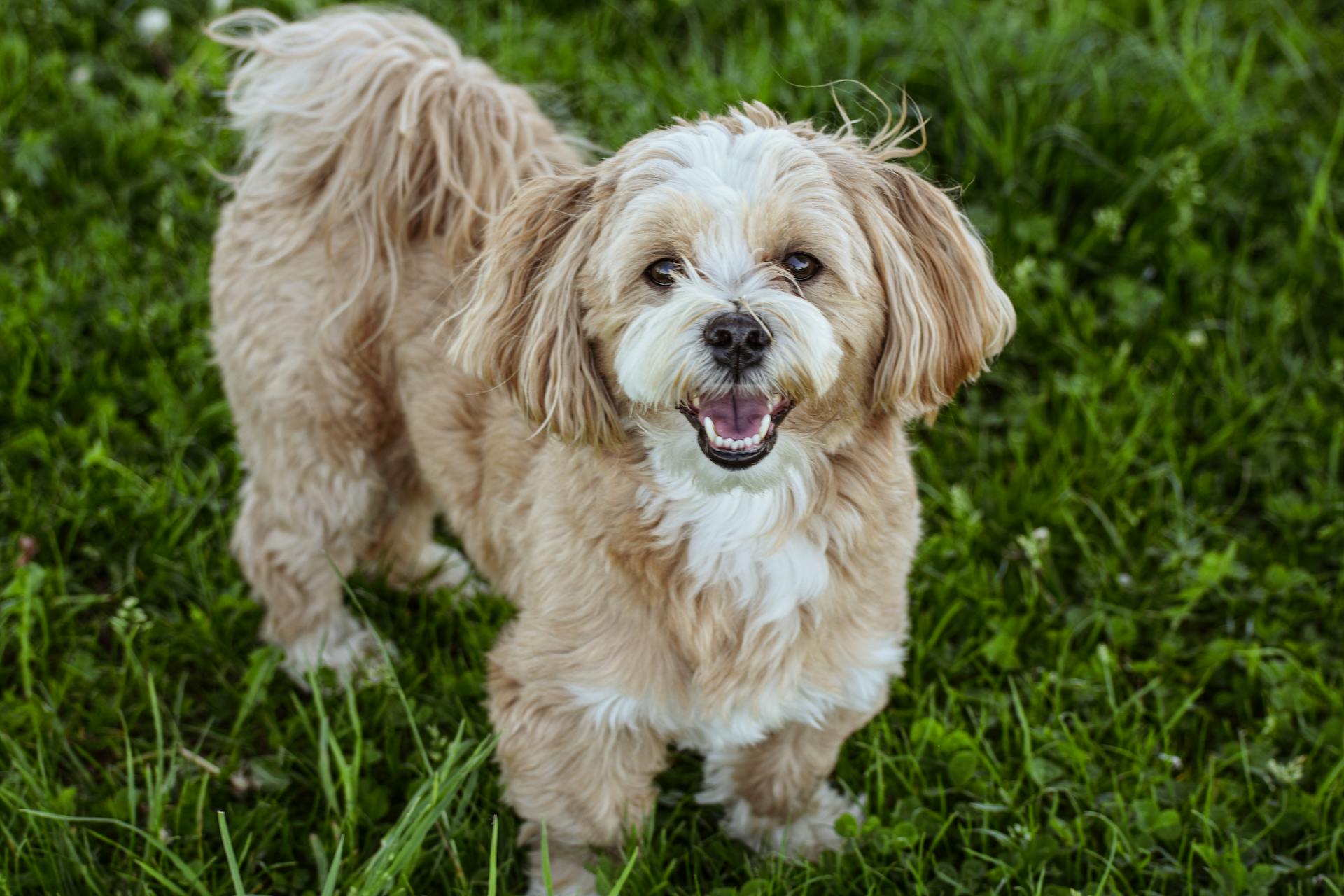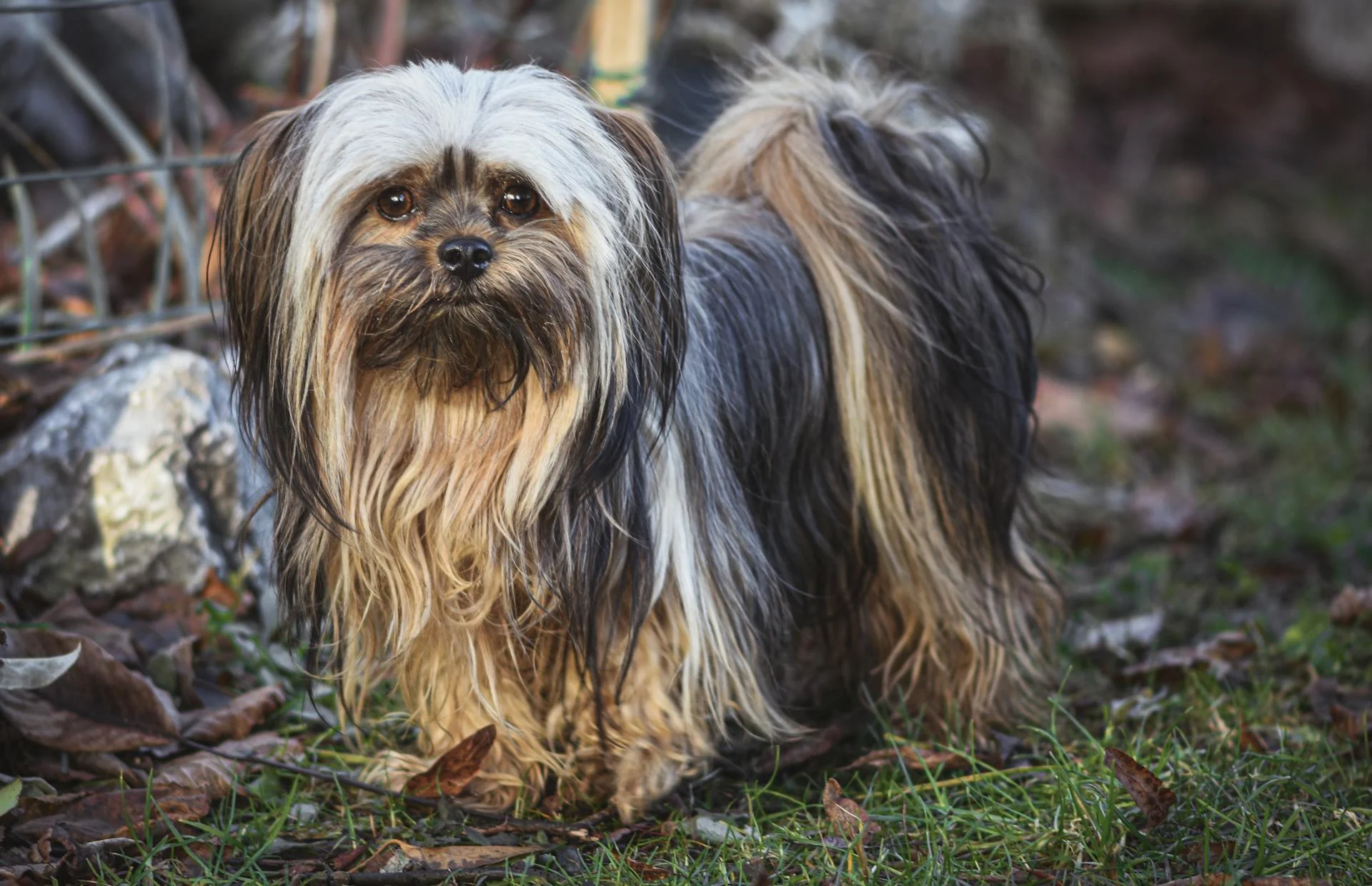
The Lhasa Apso is a beloved breed known for its long, flowing coat and gentle disposition. They are relatively small dogs, typically weighing between 13 and 18 pounds.
One of the most significant health concerns for Lhasa Apsos is their susceptibility to eye problems, including cataracts and progressive retinal atrophy. This is due to their genetic predisposition to these conditions.
Lhasa Apsos are also prone to dental issues, such as tooth decay and gum disease, which can lead to more serious health problems if left untreated. Regular dental care is essential to prevent these issues.
Their thick coat requires regular grooming to prevent matting and tangling, but it also sheds heavily, particularly during shedding season.
Additional reading: Lhasa Apso Behavior Problems
Characteristics and Traits
The Lhasa Apso is a small but sturdy dog, typically standing about 25 cm (9.8 in) tall at the withers. They have a thick and heavy coat that comes in a variety of colors, including black, red, and white.
Their eyes are dark, and their nose is black. They have pendant ears and a curved tail that's often carried over the back.
Despite their small size, Lhasa Apsos are naturally wary of strangers and make excellent watchdogs. They'll sound the alarm if they sense something unusual.
Lhasa Apsos are known for their independent nature and can be a bit stubborn at times. They require consistent training and socialization from an early age to develop good canine manners.
They're generally happy and playful, but also regal and fierce when it comes to guarding their home and family. They're not extremely active, but they do enjoy short walks and play sessions.
Lhasa Apsos are long-lived, with many living into their early 20s in good health. They're a great choice for apartment living, but they do appreciate having access to a secure yard for exercise.
They're naturally attached to their family and enjoy following them around the house. However, they're also fine with being left alone for short periods of time without suffering from separation anxiety.
Lhasa Apsos are intelligent dogs that can be a bit tetchy if not properly trained and socialized. They require a strong, kind leader to guide them and prevent them from thinking they're the top dog.
See what others are reading: Is Lhasa Apso Good for First Time Owners
Health and Care
The Lhasa Apso is a relatively healthy breed, but like all breeds, they can be prone to certain health issues. They are predisposed to atopic dermatitis, and their long, dense coat can make them more susceptible to skin problems. Regular grooming is essential to prevent matting and tangling.
Some common health issues in Lhasa Apsos include cherry eye, patellar luxation, and allergies. These can be treated with surgery, medication, and dietary changes. It's also essential to monitor their skin and coat, as they can be prone to conditions like sebaceous adenitis and keratoconjunctivitis sicca.
Here are some key health and care considerations for Lhasa Apsos:
- Cherry eye: surgery
- Patellar luxation: surgery and lifestyle changes
- Allergies: medication, dietary changes, and environmental changes
- Sebaceous adenitis: treatment varies
- Keratoconjunctivitis sicca: medication and artificial tears
Their lifespan is generally between 12 and 15 years, but some individuals can live up to 18 years or more with proper care. Regular grooming, including brushing and nail trimming, is essential to prevent health problems.
Health
The Lhasa Apso is generally a healthy breed, but like all breeds, they're prone to certain health conditions. One of the most significant health concerns for Lhasa Apsos is their predisposition to atopic dermatitis.
A fresh viewpoint: Lhasa Apso Diseases

Their life expectancy is relatively high, with a 2024 UK study showing an average life expectancy of 14 years, compared to 12.7 years for purebred dogs and 12 years for crossbreeds.
Lhasa Apsos can be susceptible to a range of health issues, including cherry eye, patellar luxation, allergies, and sebaceous adenitis. These conditions can be uncomfortable and even painful for the dog, but with proper treatment and care, many can be managed.
Some common health issues in Lhasa Apsos include:
- Cherry eye: a swollen gland in the eye that requires surgery to treat
- Patellar luxation: a dislocation of the kneecap that can be painful and crippling
- Allergies: a common issue in dogs, which can be caused by food, contact, or inhalant allergens
- Sebaceous adenitis: a genetic skin condition that can cause dry, scaly skin and hair loss
Regular veterinary check-ups and a healthy lifestyle can help prevent or manage these conditions. Additionally, keeping their ears clean and preventing infections is crucial to maintaining their overall health.
Entretien et Hygiène
The Lhasa Apso's grooming needs are quite specific, so it's essential to understand their requirements. They have long, dense coats that need regular brushing to prevent matting and tangling.
Brush your Lhasa Apso at least two times a week to keep their coat in good condition. This will prevent knots from forming and reduce shedding.

A regular brushing routine will also help prevent skin irritation and reduce the risk of infections. The Lhasa Apso's ears are particularly prone to infections, so make sure to clean them regularly.
To keep your Lhasa Apso's coat healthy, consider keeping it at a reasonable length. This will allow them to move freely and maintain good visibility.
Here's a quick rundown of the Lhasa Apso's grooming needs:
Remember, regular grooming is key to keeping your Lhasa Apso happy and healthy. By following these simple steps, you'll be able to maintain their beautiful coat and prevent any potential health issues.
Coat Color and Grooming
The Lhasa Apso coat is truly one of a kind, coming in a variety of colors including honey, black, white, slate, and parti-color. Its long, straight, and dense coat requires regular grooming to prevent matting and tangling.
Daily brushing and combing are essential to keep the coat looking its best, and frequent bathing every two to four weeks is also necessary. Many owners choose to hire a professional groomer due to the time-consuming nature of this task.
In fact, it's not uncommon for owners to have their Lhasa's coat clipped short to make grooming easier. However, this means sacrificing the beautiful flowing coat that makes the Lhasa Apso so iconic.
To prevent gum disease and bad breath, it's crucial to brush your Lhasa's teeth at least two or three times a week, with daily brushing being even better.
Here's a breakdown of the grooming needs of a Lhasa Apso:
Regular grooming sessions should also include examining your Lhasa's skin, nose, mouth, eyes, and feet for any signs of sores, rashes, or infection. By doing so, you'll be able to spot potential health problems early on and keep your Lhasa Apso happy and healthy.
Frequently Asked Questions
Is a Lhasa Apso a good family dog?
Yes, Lhasa Apsos make great family pets due to their loyal and playful nature. They thrive in families with a strong pack bond, making them a wonderful addition to many households.
What are the disadvantages of a Lhasa Apso?
Lhasa Apsos are generally a healthy breed, but they can be prone to kidney-related health issues, such as glomerular disease and renal dysplasia
Can Lhasa Apso be left alone?
Lhasa Apso can be left alone for short periods without anxiety issues. They're a great choice for busy owners who need a low-maintenance companion.
Featured Images: pexels.com
